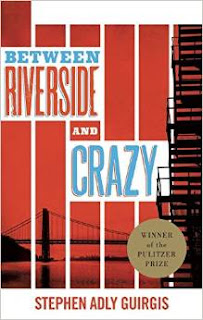Between Riverside and Crazy
Perhaps the biggest thing I miss about New York City is live theater. There is some in Las Vegas, but nothing like New York, where you can have your choice of probably 100 or more venues on a given night. I had been keeping up with the winners of the Pulitzer Prize for Drama, but as with last year's The Flick, for the 2015 award winner, Between Riverside and Crazy, I have to make do with reading it.
The play was written by Stephen Adly Guirgis, who before this was best known as writing a play that had an unprintable title (The Motherfucker With the Hat). A man of Egyptian and Irish heritage, he wrote a play about a retired black cop living in a rent-controlled apartment on Riverside Drive, besieged at all sides by an ex-con son who is still trafficking in stolen goods, the son's lollapalooza girlfriend, and his old partner, who has brought over her fiance to try to strong-arm him into settling a lawsuit against the police department.
The main character, Walter "Pops" Washington, is the best thing about the play, which otherwise has some creaks. I didn't seen Stephen McKinley Henderson, who played the role in New York, so I kept picturing the late Ossie Davis in the role. Pops is a great character, one that will be drooled over by black actors of a certain age for some time to come. He is garrulous, profane, belligerent, and drunk most of the time. He was wounded by another cop, shot six times, and has refused settlements, even though he was in a bar at six in the morning and off-duty. He tells it like it is, such as when he's told that his son's girlfriend is an accounting student: "That girl, she a nice girl, but she don't no accounting. Her lips move when she read the horoscope--that ain't the mark of a future accountant."
The central conflict of the play is the encounter between Pops and his old partner at the end of Act I, when truths come out like vermin climbing out of the walls (the apartment is described as being in ruins, including several piles of ancient dog shit). But I was disappointed in the beginning of Act II, when Pops meets with a woman from his departed wife's church. Known only as the "Church Lady" (no, not Dana Carvey), she's a Catholic but also member of a Brazilian cult like Santeria. There is a miraculous event that smacked of inaunthenticity and took the play in a direction that didn't maintain its tone.
The end of the play, when Pops gets the last laugh, was satisfactory, but on the whole I give this play three stars out of five. I would like to see it performed some day. What we who out in the hinterlands needs is for Fathom Events, who broadcast the Metropolitan Opera on movie screens, to do the same with New York stage productions.
The play was written by Stephen Adly Guirgis, who before this was best known as writing a play that had an unprintable title (The Motherfucker With the Hat). A man of Egyptian and Irish heritage, he wrote a play about a retired black cop living in a rent-controlled apartment on Riverside Drive, besieged at all sides by an ex-con son who is still trafficking in stolen goods, the son's lollapalooza girlfriend, and his old partner, who has brought over her fiance to try to strong-arm him into settling a lawsuit against the police department.
The main character, Walter "Pops" Washington, is the best thing about the play, which otherwise has some creaks. I didn't seen Stephen McKinley Henderson, who played the role in New York, so I kept picturing the late Ossie Davis in the role. Pops is a great character, one that will be drooled over by black actors of a certain age for some time to come. He is garrulous, profane, belligerent, and drunk most of the time. He was wounded by another cop, shot six times, and has refused settlements, even though he was in a bar at six in the morning and off-duty. He tells it like it is, such as when he's told that his son's girlfriend is an accounting student: "That girl, she a nice girl, but she don't no accounting. Her lips move when she read the horoscope--that ain't the mark of a future accountant."
The central conflict of the play is the encounter between Pops and his old partner at the end of Act I, when truths come out like vermin climbing out of the walls (the apartment is described as being in ruins, including several piles of ancient dog shit). But I was disappointed in the beginning of Act II, when Pops meets with a woman from his departed wife's church. Known only as the "Church Lady" (no, not Dana Carvey), she's a Catholic but also member of a Brazilian cult like Santeria. There is a miraculous event that smacked of inaunthenticity and took the play in a direction that didn't maintain its tone.
The end of the play, when Pops gets the last laugh, was satisfactory, but on the whole I give this play three stars out of five. I would like to see it performed some day. What we who out in the hinterlands needs is for Fathom Events, who broadcast the Metropolitan Opera on movie screens, to do the same with New York stage productions.



Comments
Post a Comment